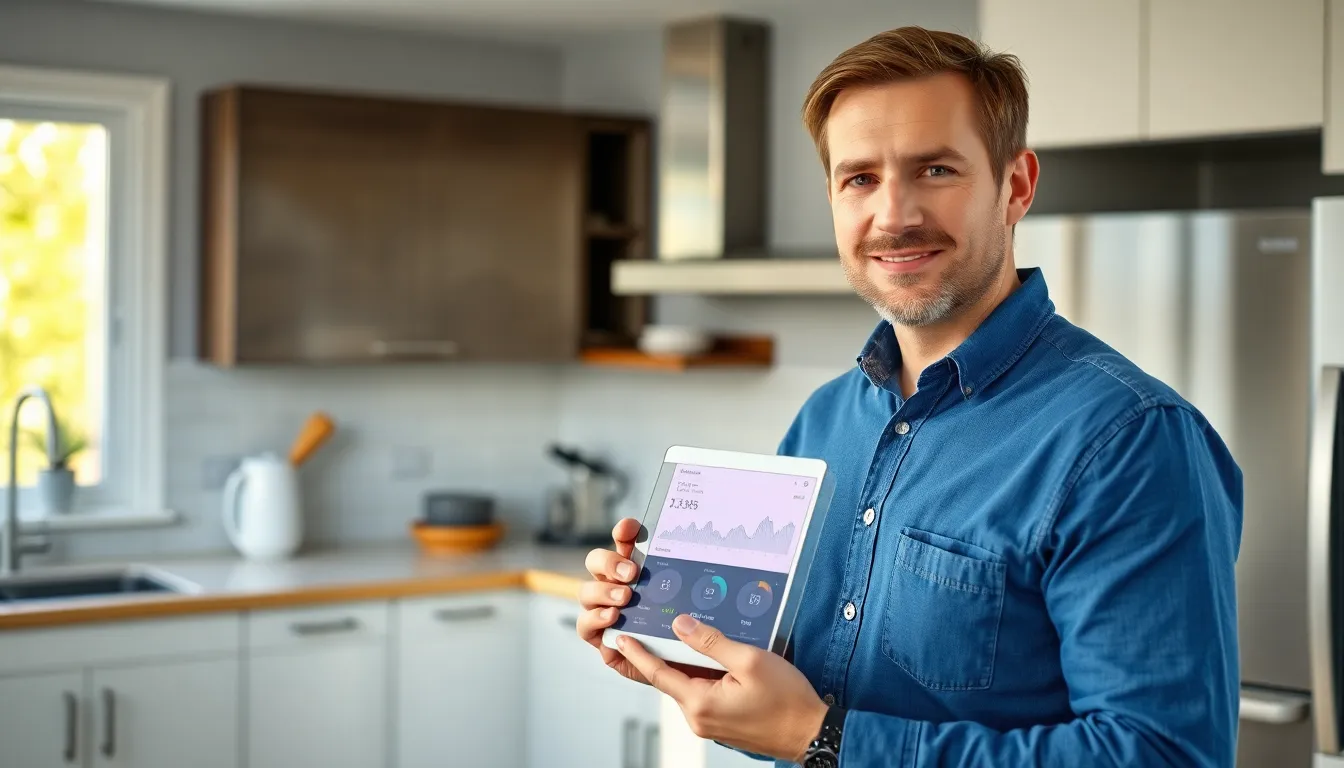In a world where energy bills seem to have a mind of their own, home energy monitoring emerges as the superhero we never knew we needed. Imagine having the power to track your energy usage in real time, like a detective solving the mystery of the disappearing dollars. With a few clicks, homeowners can unveil the secret lives of their appliances and put an end to the energy vampires lurking in the shadows.
Table of Contents
ToggleOverview Of Home Energy Monitoring
Home energy monitoring refers to technologies that track energy consumption in real time. Devices connected to the home’s electrical system measure usage, providing detailed insights into energy expenditure. Homeowners gain the ability to identify patterns in energy consumption, which can reveal which appliances use the most energy.
Real-time tracking enhances awareness of energy costs. By utilizing dashboards or mobile apps, individuals see energy usage data clearly, allowing immediate adjustments to habits. Awareness creates the foundation for informed decisions that lead to significant savings.
Many systems also feature alerts for unusual consumption spikes. Such notifications prompt homeowners to investigate potential issues, such as faulty appliances or unexpected usage patterns. Addressing these problems quickly not only saves money but also prolongs the life of appliances.
Technologies available range from smart plugs to comprehensive whole-home energy systems. Smart plugs offer cost-efficient monitoring on a smaller scale, while whole-home systems provide a holistic view of total energy consumption. Both options empower users to take action based on their energy data.
Integrating home energy monitoring with smart home systems enhances efficiency further. Homeowners can automate energy-saving measures, like adjusting thermostats or scheduling devices based on usage patterns. This integration maximizes energy conservation and contributes to overall sustainability.
Implementing home energy monitoring brings immediate benefits. As individuals track their consumption, they often discover ways to reduce waste and lower energy bills. Monitoring energy use directly correlates with increased efficiency and sustainability efforts at home.
Benefits Of Home Energy Monitoring
Home energy monitoring provides multiple advantages that enhance not only financial savings but also environmental sustainability.
Energy Savings
Energy savings represent a key benefit of implementing home energy monitoring. Homeowners track their consumption patterns in real time, identifying and eliminating unnecessary usage. By recognizing which appliances consume the most energy, actions can be taken to reduce their operation. Smart plugs and energy-efficient appliances allow further optimization. Research shows that users can achieve savings of up to 20% on their energy bills by making informed decisions based on their monitoring data. Ultimately, cutting costs on monthly utility bills leads to a quicker return on investment for energy monitoring systems.
Environmental Impact
Environmental impact reflects another significant advantage of home energy monitoring. Reducing energy consumption decreases greenhouse gas emissions, aligning with global sustainability goals. When households limit their unnecessary usage, they contribute to a reduced demand for fossil fuels. Integrating monitoring systems helps homeowners adopt energy-saving habits, which promotes efficient resource use. Research indicates that widespread adoption of energy monitoring can lead to a 10% reduction in national energy consumption. Moreover, these practices cultivate a sense of responsibility towards the environment, encouraging a greener lifestyle in the community.
Types Of Home Energy Monitoring Systems
Home energy monitoring systems vary in design and functionality. These systems empower homeowners to understand and manage energy consumption effectively.
Real-Time Monitoring
Real-time monitoring systems track energy usage as it occurs. These setups typically utilize sensors installed in the home’s electrical panel. Observations of energy usage patterns help in identifying peak consumption hours. Insights gained allow homeowners to adjust their habits and devices accordingly. Notifications alert users to unusual spikes in usage, promoting immediate action on possible inefficiencies. Adopting real-time monitoring often leads to increased awareness of energy consumption, allowing individuals to save more effectively.
Smart Meters
Smart meters represent advanced energy monitoring solutions. These devices replace traditional meters and provide detailed reports of energy use. Data collected gives homeowners insights into their consumption at various times of the day. Users can access this information remotely via smartphone applications or web portals. Smart meters also enable utility companies to communicate with customers directly. Immediate feedback on energy usage can lead to more informed choices regarding energy use. By educating on energy consumption patterns, smart meters play a crucial role in promoting energy efficiency.
Features To Look For
When considering home energy monitoring systems, several key features enhance usability and effectiveness. Understanding these features helps homeowners make informed decisions.
User-Friendly Interface
A clear and intuitive interface makes navigation easy. Users often prefer displays that provide immediate visibility into energy usage. Systems equipped with mobile applications facilitate real-time access to energy data on smartphones, ensuring convenience. Charted data allows homeowners to visualize trends and make timely adjustments. Simplified dashboards lower the learning curve for users of all technological backgrounds. Overall, a user-friendly interface promotes consistent engagement with the energy monitoring system.
Data Analysis Capabilities
Robust data analysis capabilities unearth deeper insights from energy consumption patterns. Systems that capture minute-by-minute usage help users identify inefficiencies quickly. Advanced units utilize machine learning algorithms, enabling predictive analytics for future consumption scenarios. Accurate reporting on energy spent per appliance aids in targeted savings. Customizable alerts notify users of unusual spikes in consumption, prompting swift action. Effective data analysis skills contribute significantly to lowering energy bills and optimizing home efficiency.
Popular Home Energy Monitoring Solutions
Various home energy monitoring solutions provide homeowners with tools to manage energy consumption. Real-time monitoring systems effectively track energy usage through sensors located in the electrical panel. These systems identify peak consumption hours and highlight inefficiencies.
Smart meters serve as advanced replacements for traditional meters. They offer detailed reports and allow remote access to energy data via smartphone applications. With instant feedback, homeowners can make informed choices regarding energy use.
Smart plugs represent a cost-efficient option for monitoring specific devices. By plugging appliances into smart plugs, users can easily track individual energy usage. This method also enables scheduling, reducing energy waste during off-peak hours.
Whole-home energy monitoring systems provide comprehensive insights into energy consumption. These systems connect directly to the electrical panel, delivering real-time data. Many users prefer these solutions for complete visibility into their household energy usage.
Energy management platforms combine monitoring capabilities with data analysis. These platforms often support machine learning algorithms for predictive analytics. Such features enable homeowners to proactively address inefficiencies and enhance overall energy efficiency.
In addition to tracking consumption, some systems offer customizable alerts for unusual usage spikes. This feature helps users stay informed about potential issues with appliances, ensuring timely maintenance. Homeowners increasingly rely on these solutions to foster energy-saving habits throughout their households.
Another popular option includes integration with smart home systems. This integration automates energy-saving measures, such as adjusting heating and cooling based on usage patterns. Ultimately, by selecting the right home energy monitoring solution, homeowners can enjoy significant savings and contribute to sustainability goals.
Conclusion
Home energy monitoring stands as an essential tool for modern homeowners. By providing real-time insights into energy consumption it empowers individuals to make informed decisions that lead to significant savings. The technology not only helps identify inefficiencies but also fosters a culture of sustainability by encouraging reduced energy waste.
With various monitoring solutions available homeowners can choose systems that best fit their needs. Whether opting for smart plugs or comprehensive whole-home systems the benefits are clear. Increased awareness of energy usage translates to lower bills and a smaller environmental footprint.
Embracing home energy monitoring is more than just a financial decision; it’s a step towards a more sustainable future. As homeowners adopt these technologies they contribute to a collective effort in reducing national energy consumption and promoting greener living.



